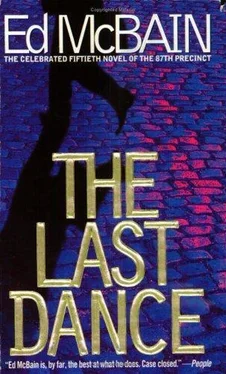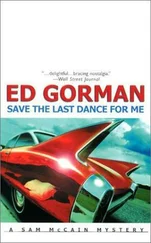"Who signed it?" he asked.
"Carl Blaney."
. . . seemed abruptly bored by it, and tossed it back
onto the desk again.
"Did you also speak to Blaney in person?" he asked.
"Yes, I did."
"Did he have anything to add to his findings?"
"Only that because the ligature around the neck was
soft and wide, there was only a faint impression of the
loop on the skin. But the knot caused a typical abrasion
under the chin."
"All right, ask your questions," Alexander said. "We
haven't got all day here."
"Mrs Keating," Carella said, "what time did you get
to your father's apartment this morning?"
"A little after ten."
"Did you call the Emergency Service number at ten-oh-seven a.m.?"
"I don't know the exact time."
"Would this refresh your memory?" Carella asked,
and started to hand her a computer printout.
"May I see that, please?" Alexander said, and took it
from Carella's hand. Again, he looked at the document
only perfunctorily, handed it to Cynthia, and asked, "Did
you make this call?"
"Well, may I see it?" she said.
He handed her the printout. She read it silently and
said, "Yes, I did."
"Is the time correct?" Carella asked.
"Well, that's the time listed here, so I guess that's the time it was."
"Ten-oh-seven."
"Yes."
"Did you tell the operator that you'd just come into
your father's apartment and found him dead in bed?"
"Yes, I did."
"Did you ask her to send someone right away?"
"I did."
"Here's the call sheet from Adam Two," Carella said.
"Their time of arrival . . ."
"Adam Two?" Alexander asked.
"From the precinct here. One of the cars patrolling
Adam Sector from eight a.m. to four p.m. today. Mr
Bale's apartment is in Adam Sector. They list their time
of arrival as ten-fifteen a.m. And this is my own Detective
Division report, which lists the time of our arrival as ten-thirty-one. My partner and I. Detective Meyer and myself."
"All of which is intended to prove what, Detective?"
"Nothing at all, sir, except the sequence of events."
"Remarkable," Alexander said. "Not twenty-four min
utes after Mrs Keating called , there were no fewer
than four policemen at the scene! Wonderful! But before
you ask any more questions, may I ask where all this is
going?"
"I want Mrs Keating to tell me what she did before
she called ."
"She's already told you. She came into the apartment,
found her father dead in his own bed, and immediately
called the police. That's what she did, Detective."
"I don't think so."
"What do you think she did?"
"I don't know. But I do know she was in that apartment for almost forty minutes before she called the emergency number."
"I see. And how do you know that?"
"The super told me he saw her going in at nine-thirty."
"Is that true, Cynthia?"
"No, it's not."
"In which case, I'd like to suggest that we call off the questioning and go about our more productive endeavors. Detective Carella, Detective Meyer, it's been a distinct . . ."
"He's down the hall," Carella said. "In the lieutenant's
office. Shall I ask him to come in?"
"Who
is down the hall?"
"The super. Mr Zabriski. He remembers it was nine-
thirty because that's when he puts out the garbage cans
each morning. The truck comes by at nine-forty-five."
The room was silent for a moment.
"Assuming you do have this super . . ." Alexander
said.
"Oh, I have him, all right."
"And assuming he did see Mrs Keating entering the
building at nine-thirty . . ."
"That's what he told me."
"What exactly do you think happened in that apart
ment between then and ten-oh-seven, when she called the emergency number?"
"Well," Carella said, "assuming she herself didn't hang her father from that bathroom hook—"
"Goodbye, Mr Carella," Alexander said, and rose abruptly. "Cynthia," he said, "leave us hie yonder. Bob," he said to her husband, "it's a good thing you called me. Mr Carella here is fishing for a murder charge."
"Try Obstruction," Carella said.
"What?"
"Or Tampering with Evidence."
"What?"
"Or both. You want to know what I think happened,
Mr Alexander? I think Mrs Keating found her father hanging from that hook . . ."
"Let's go, Cynthia."
". . . and took him down and carried him to the bed.
I think she removed . . ."
"Time's up," Alexander said cheerfully. "Goodbye,
Detec . . ."
". . . the belt from his neck, took off his shoes and
socks, and pulled a blanket up over him. Then she called the police."
"For what purpose?" Alexander asked.
"Ask her, why don't you? All /know is that Obstructing
Governmental Administration is a violation of Section
. of the Penal Law. And Tampering with Evidence
is a violation of Section .. Obstructing is a mere
A-Mis, but . . ."
"You have no evidence of either crime!" Alexander
said.
"I know that body was movedl" Carella said. "And
that's Tampering! And for that one, she can get four years
in jail!"
Cynthia Keating suddenly burst into tears.
The way she tells it
...
"Cynthia, I think I should advise you," her attorney
keeps interrupting over and over again, but tell it she will, the way all of them—sooner or later—will tell it if they will.
"The way it happened," she says, and now there are
three
detectives listening to her, Carella and Meyer who caught the squeal, joined by Lieutenant Byrnes, because
all of a sudden this is interesting enough to drag him out of
his corner office and into the interrogation room. Byrnes
is wearing a brown suit, a wheat colored button-down
shirt, a darker brown tie with a neat Windsor knot. Even dressed as he is, he gives the impression of a flinty Irishman who's just come in off the bogs where he's been gathering peat. Maybe it's the haircut. His gray hair looks windblown, even though there isn't a breeze stirring in this windowless room. His eyes are a dangerous blue; he doesn't like anyone messing with the law, male or female.
"I stopped by to see him," Cynthia says, "because
he really hadn't been feeling too good these days, and
I was worried about him. I'd spoken to him the night before . . ."
"What time was that?" Carella asks.
"Around nine o'clock."
All three detectives are thinking he was still alive at nine last night. Whatever happened to him, it happened
sometime after nine p.m.
Her father's apartment is a forty-minute subway ride
from where she lives across the river in Calm's Point.
Her husband usually leaves for work at seven-thirty. Their habit is to have breakfast together in their apartment overlooking the river. After he's gone, she gets ready for her own day. They have no children, but neither does she work, perhaps because she never really trained for anything, and at thirty-seven there's nothing productive she can really do. Besides—
She has never mentioned this to a soul before but she
tells it now in the cramped confines of the interrogation
room, three detectives sitting attentively stone-faced on
one side of the table, her husband and her attorney sitting equally detached on the other. She doesn't know why she
admits this to these men now, here in this confessional
chamber, at this moment in time, but she tells them without hesitation that she never thought of herself as being particularly bright, just an average girl (she uses the word "girl") in every way, not too pretty, not too smart, just, well . . . Cynthia. And shrugs.
Cynthia is not one of the Ladies Who Lunch, but she nonetheless busies herself mindlessly throughout the day, shopping, going to galleries or museums, sometimes catching an afternoon movie, generally killing the time between seven-thirty a.m. when her husband leaves for work and seven-thirty at night, when he gets home. "He's in corporate law," she says, as if this completely explains his twelve-hour day. She is grateful, in fact, for the opportunity to visit her father. It gives her something to do.
Читать дальше












